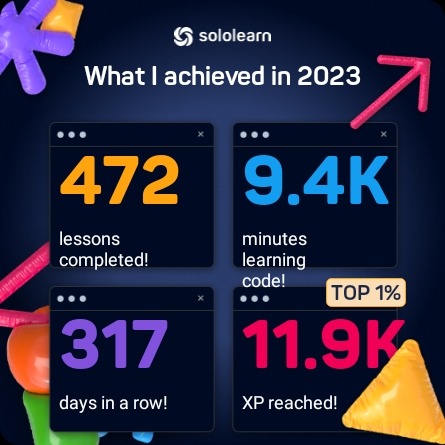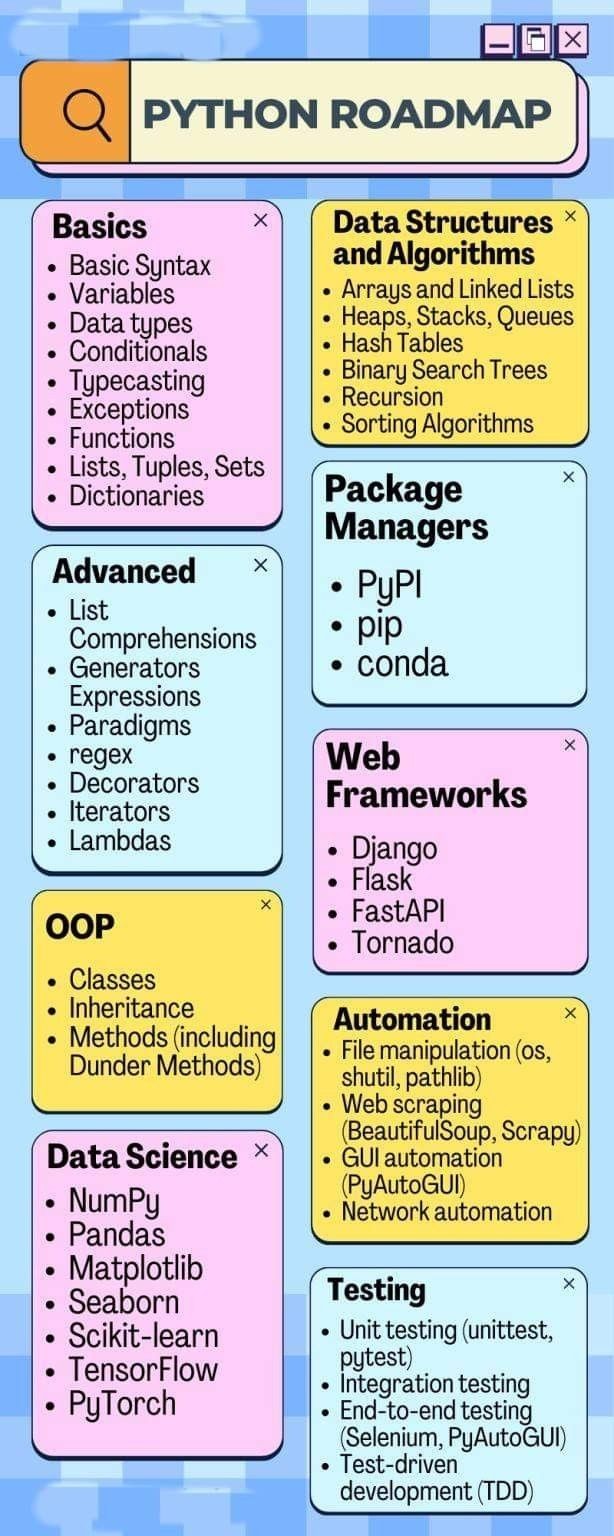Latest Posts by python-programming-language - Page 3
A Leap Year? - This Is The Question Of The Day ...

This is how you work out whether if a particular year is a leap year.
On every year that is divisible by 4 with no remainder
Except every year that is evenly divisible by 100 with no remainder
Unless the year is also divisible by 400 with no remainder

Source: Angela Yu, Udemy, 2024
Year 2000:
2000 ÷ 4 = 500 (Leap)
2000 ÷ 100 = 20 (Not Leap)
2000 ÷ 400 = 5 (Leap!)
So, year 2000 is a leap year.

Year 2100:
2100 ÷ 4 = 525 (Leap)
2100 ÷ 100 = 21 (Not Leap)
2100 ÷ 400 = 5.25 (Not Leap)
But year 2100 is not a leap year.

Post #113: Free Programming Exercise, Leap Year, 2024.
Die Top 7 ShortCuts für Visual Studio Code ...
Post #112: YouTube, Programmieren lernen, Die Top 7 ShortCuts für Visual Studio Code, 2024.
! + Enter - Insert A Code-Snipet
Strg + Spacebar - Open Auto-Completion
Strg + # - Insert The Current Comment Sign
Function-Name + F12 - Go To The Function-Body
Strg + F2 - Change All Occurences
Strg + P - Find A File
Strg + Shift + F - Global Search
A Repl? Yes, a Repl! Let's create a Repl ...
It's a Read-Evaluate-Print-Loop ...
Post #111: Surfing Scratcher, How To Use Replit Python, Introduction To Replit, 2024.
Niklaus Wirth
15.2.1934 - 1.1.2024

Niklaus Wirth war gebürtiger Schweizer, studierte Ingenieur-Wissenschaften und war auch als Informatiker tägig gewesen. Er entwarf die Programmiersprache "PL360", die 1968 auf dem "IBM System/360" implementiert wurde. Weiterhin beteiligte sich Wirth an der Weiterentwicklung und Verallgemeinerung der Sprache "Algol". Insbesondere schuf er in Zusammenarbeit mit Tony Hoare die Sprache "Algol W" und wirkte an der Entwicklung von "Algol 68" mit. Enttäuscht über die stetig zunehmende Komplexität der Entwürfe zu dieser Sprache definierte und implementierte er in den Jahren 1968 bis 1972 praktisch im Alleingang die Programmiersprache "Pascal".
Quelle: Wikipedia
Post #110: Heise Online, Niklaus Wirth, Eine Optimierung beim Programmieren erfordert Zeit, 2024.

SoloLearn was one of my favourite learning platforms for programming languages on the internet in 2023. I think my power, endurance and success time were awesome.
Post #109: My Progress on SoloLearn 2023, 2024
Built-In Data Types As Objects In Python ...

Post #108: W3Schools, Built-in data types in Python, 2023.

This is really a very helpful and big tutorial to learn the use of the code editor "Visual Studio Code" by Microsoft. You can watch it on the learning platform "Udemy" and if you are waiting for some time, it will be possible to purchase only around 15 Euros for this excellent tutorial.
Post #107: Udemy, Estefania Cassingena Navone, Visual Studio Code for Developers 2024, Beginner to Advanced, 2023.

Post #106: Python.Hub on Instagram, The different operators in Python, 2023.
Do you know the online tutor EASY CODER?

Post #105: Esay Coder, Learn JAVA and PYTHON programming with ease, 2023.

Post #104: LearnPython, Blog, Luke Hande, How to run a Python script in Windows, 2023.
The Python Institute ...

Post #103: The Python Institute, The Language Of Today And Tomorrow, 2023.
"Python Course for Beginners" with Estefanía ...
Post #102: YouTube, Estefanía Cassingena-Navone, Learn Python In 2 Hours, 2023.
Estefanía is one of my favourite programming instructors. She explains step by step and visualizes wonderfully. I also like her voice and how she gets to the heart of the learning content. I have booked several coding courses on Udemy which are really excellent.
Literaturtipp: Codierung in 30 Sekunden ...



Post #101: Literaturtipp, Mark Steadman, Codierung in 30 Sekunden, Librero IBP Verlag, Niederlande, 160 Seiten, 2023.
SoloLearn: My "Python Developer" Certificate ...

My certificate ...

The structure and modules of the Python Developer Course ...


Post #100: SoloLearn, The structure and my certificate of the "Python Developer" Course, 2023.
The Complete History of Python ...
Post #99: YouTube, School Room Help, The complete history of Python, 2023.
SoloLearn: OOP - Class And Static Methods ...
Class Methods in Python


SoloLearn: Python Developer Course ...



Learning Object-Oriented Programming ...


SoloLearn: Practice The Static Methods ...



I am proud to solve this little coding exercise ...


Post #98: SoloLearn, Programming And Learning Community, Python Developer Course, Chapter: OOP / object-oriented programming, 2023.
Objektorientierung in Python ...
Post #97: YouTube, Coding Crashkurse, OOP Masterkurs, From Newbie To Expert, OOP Komplettkurs, 2023.
Eine umfangreiche Einführung in Python 3 ...


Post #96: Bernd Klein, Einführung in Python 3 für Ein- und Umsteiger, Hansa Verlag, 2. Auflage, 494 Seiten, 2014.
SOLOLEARN - A big platform to learn some programming languages ...

If you have a minute, why not visit Sololearn's website? It might be worth for you!

I've been learning with Sololearn for about 260 days now, especially Python, but a bit of HTML, JavaScript and C#, too. It's still a lot of fun for me.
Post #95: Sololearn, The best way to learn to code, 2023.
MIMO - My SQL Certificate ...

Post #94: MIMO, Learn To Code, My SQL Certificate, 2023.
Python Tutorial #24 Methoden in Klassen ...
Das ist das letzte Video des Python Tutorials von "Programmieren-Starten". Wer tiefer in die Programmierung mit Python einsteigen möchte, dem kann ich den "Masterkurs" von "Programmieren-Starten" empfehlen, den ich auch komplett durchgearbeitet habe.

Post #93: YouTube, Programmieren Starten, Python Tutorial, #24/24 Methoden in Klassen, 2023.
Is it possible to learn Python by using Android apps?

Post #92: Analytics Insight, 5 Android Apps To Learn Python, 2023.

Post #91: Pinterest, @usamaawan5752, Python Road Map, 2023.
Post #90: The pillars of object-oriented programming: Object, Class, Inheritance, Polymorphism, Abstraction and Encapsulation, 2023.
The concept of object oriented programming explained
Object-oriented programming is a fundamental concept present in numerous programming languages such as C++, Java, JavaScript, and more. It becomes straightforward once you truly grasp it, and that's precisely what this post aims to help you achieve. So, stop your scrolling for a second and delve into this post for a thorough and clear explanation.

Understanding the Term "Object-Oriented"
To grasp OOP, let's begin by explaining the name itself: "Object-Oriented." This term signifies that OOP revolves around entities known as "objects."
What Exactly Is an Object?
An object in OOP is any entity that possesses both state and behavior. Consider a dog as an example: it has states such as color, name, and breed, while its behaviors encompass actions like wagging the tail, barking, and eating.
The reason we introduce the concept of objects in programming is to effectively represent real-world entities, a task that cannot be accomplished with conventional variables or arrays.
Classes: Abstract Forms of Objects
Now, what about classes? A class is essentially the abstract form of an object. If we take the example of a "dog," the object "Mydog" is a concrete instance, while the class "dog" represents dogs in a more general sense. Think of a class as a blueprint or template from which you can create individual objects.
Four Pillars of Object-Oriented Programming
Now that we've established the fundamentals of objects and classes. OOP is built upon four key principles:
Inheritance: Inheritance occurs when one object inherits all the properties and behaviors of a parent object. It promotes code reusability and facilitates runtime polymorphism.
Polymorphism: Polymorphism entails performing a single task in multiple ways. For instance, it can involve presenting information differently to customers or implementing different shapes like triangles or rectangles.
Abstraction: Abstraction is about concealing internal details while exposing functionality. Consider a phone call; we don't need to understand the intricate inner workings.
Encapsulation: Encapsulation involves bundling code and data into a single unit. Just like a capsule contains various medicines . In a fully encapsulated class (e.g., a Java bean), all data members are private, ensuring data integrity and controlled access.
I remember finding these images that explained these concepts using the 'Squid Game' series, and they are just perfect. So, I'm sharing them here and giving all credit to their owner :
Polymorphism , Inheritance , Encapsulation
Python Tutorial #23 Der Self-Parameter ...
Post #89: YouTube, Programmieren Starten, Python Tutorial, 23/24 Der "Self" Parameter, 2023.
Different ways of debugging my source code ...

Post #88: www.pythonforbiologists.com, My code isn't working, 2023.
FreeCodeCamp recommend this Python course ...

Post #87: FreeCodeCamp, Beau Carnes, Ultimate Beginner's Python Course on YouTube by Dave Gray, 2023.
Java Vs JavaScript: Exploring Their Differences ...

Post #86: Analytics Insight, Deva Priya, Java Vs JavaScript: Exploring Their Differences, 2023.
Python Tutorial #22 Klassen und Objekte ...
Post #85: YouTube, Programmieren Starten, #22/24 Klassen und Objekte, 2023.
Gottfried Leibniz und das binäre Zahlensystem ...
Post #84: YouTube, TimeLine Deutschland, Gottfried Leibniz: Das größte Genie aller Zeiten, 2023.
